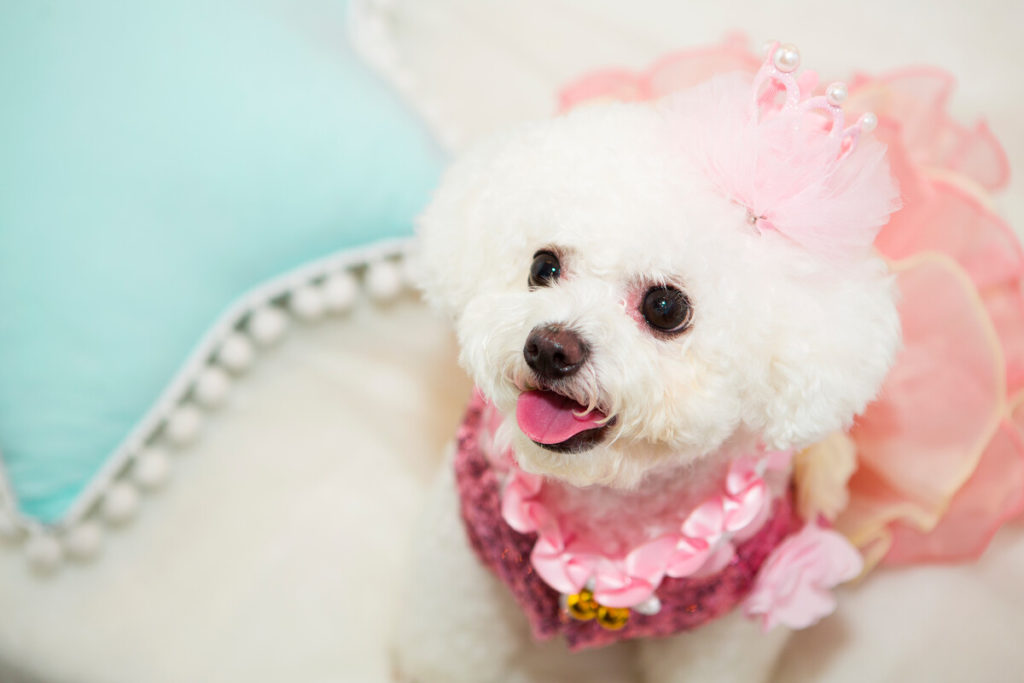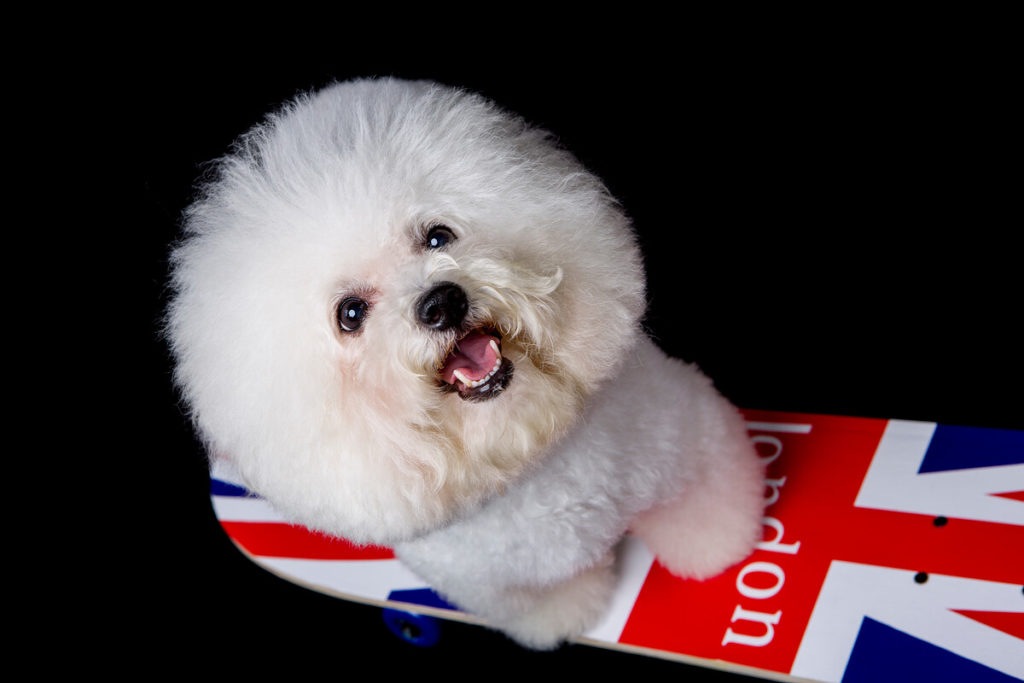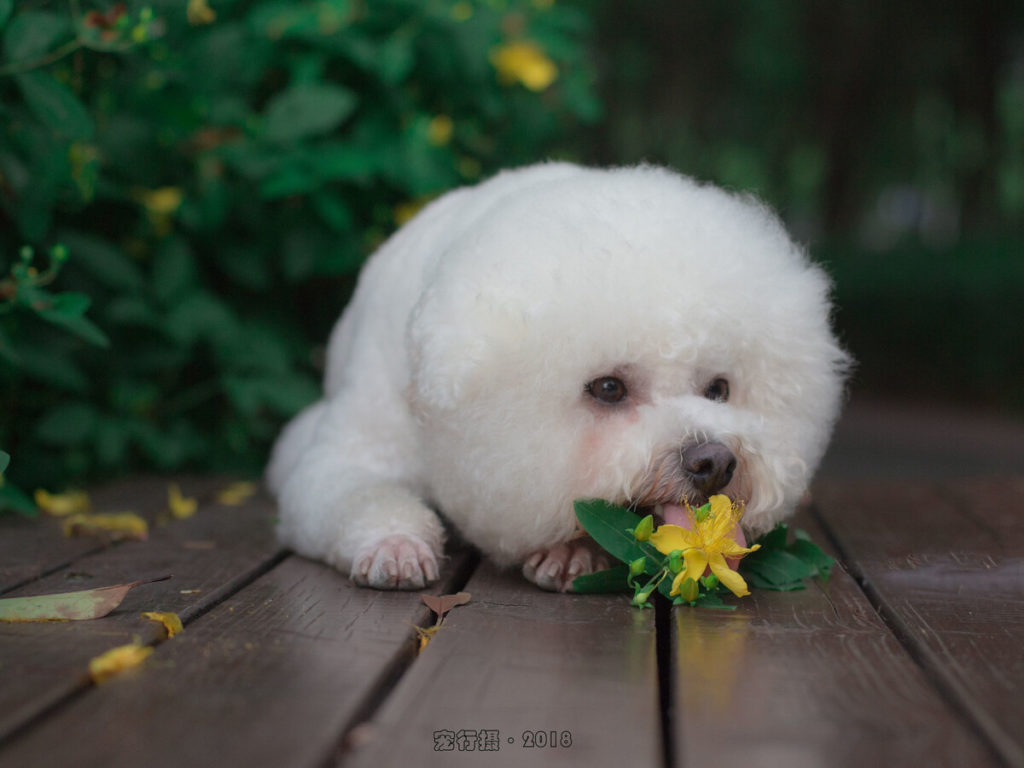Is a Bichon Frise easy to train? Have you considered the need for Bichon Frise training? Most owners think Bichon Frise and other small dogs have no need for obedience training. However, this is a fallacy. If your Bichon Frise isn’t well-trained, he can be yappy, bossy and misbehave whenever he’s near strangers.
When is the ideal time to begin training your Bichon Frise pup? Generally speaking, you need to start training from the time he enters his new home. If you leave it until he’s mature, you’ll need to break him of all bad habits he has accrued during his early months with you.
Because it can be a big challenge to fully train your Bichon Frise puppy, I’ll discuss all the ins and outs of Bichon Frise training so your knowledge will be complete.

How to Train a Bichon Frise Puppy and What Things Should I Teach Him to Do?
Bichon Frise aren’t difficult to train. They learn commands quickly, they’re clever, and you can use food to motivate them to do whatever you want. However, they can also be very stubborn and, unless they regard you as their pack leader, they may simply ignore your orders completely. You must be firm and confident before you can achieve your training goals.
Many Bichon Frise owners feel confused when deciding what to teach their puppy but if you follow these Bichon Frise Training Tips, it will be easier for you to cope.
House Training a Bichon Frise Puppy
The number one training task that begins the moment you bring your brand-new Bichon Frise puppy home is potty training. Don’t put it off or he’ll start peeing wherever he wants and you’ll find it more difficult to stop him doing so.
The majority of canine specialists suggest it’s best to be outside when housetraining your puppy. However, if you don’t mind mess, you can housetrain him inside with a litter box or make use of peeing pads. It’s vital that you make the decision about where to housetrain him beforehand. If you don’t, you have a tough time making changes because your Bichon Frise puppy will feel confused and it will increase the length of time it takes to fully housetrain him.
Once you have chosen, a big part of the training is to take your puppy to that spot as often as possible and that includes after all meals, play sessions and after naps. Whenever he does his business in the designated spot, reward him using your happy voice.
Teach Simple Commands
Are Bichon Frise easy to train? This is likely to be a question on your mind constantly. In a sense they are, as long as you follow the tips found here and in other places I can recommend. Housetraining isn’t the only thing to teach your Bichon Frise puppy. There are other simple commands he needs to learn. Known as “obedience training,” it will help you and your Bichon Frise puppy bond and build a good level of trust. It’s also essential so you’re able to control him whenever strangers are around and stop him misbehaving.
A perfect starting point is to choose his name. Don’t make it fancy and/or long. An easy one-syllable name is something he’ll remember without much effort.
After teaching him to respond when you use his name, other commands would include: sit, stay, drop it, down, come and anything else you can think of.
There’s an art to Bichon Frise dog training. Take your time and master one command before moving onto the next one. Finish every session on a positive note helps your puppy remember it.

Bichon Frise Leash Training
Teaching your Bichon Frise puppy to walk while he’s on a leash is an essential part of his overall training. There are plenty of owners who enjoy carrying their Bichon Frise puppies around because they’re so small. While they may also seem to be fragile, they can walk on the ground without any problems, despite having very short legs.
Your Bichon Frise must have regular daily exercise or he’ll become a chubby puppy in no time. It’s also critical that your Bichon Frise has a leash on while he’s out walking, especially if it’s in places where there’s a lot of traffic or he may get hurt.
Bichon Frise find it difficult to wear collars because they’re so small and are prone to having a collapsed trachea. So, while teaching your Bichon Frise puppy how to walk while he’s wearing a leash, also use a harness instead of the throat collar.
I recommend purchasing a harness that’s easy to adjust and is comprised of breathable material because he could overheat due to his thick double coat. It’s essential to make sure his harness is adjusted properly.
Bichon Frise are so tiny that certain harnesses made for small breeds of dogs may actually be too big and/or too tight for him. So, you must ensure your Bichon Frise puppy is comfortable wearing a leash and harness. If he doesn’t wear it, he may get lost or even stolen.
Teach Your Bichon Frise Puppy to Accept Grooming
Bichon Frise training should include grooming. Get your Bichon Frise puppy accustomed to grooming from an early age. A Bichon Frise is a long-coated dog and grooming is going to play a big part in your dog’s life, so start early.
We start grooming the Bichon Frise when they’re very young. There shouldn’t be any trouble if you start bathing them from ages 5 – 6 weeks, provided that you make sure your puppy is 100% dry afterwards.
The trick to training your Bichon Frise puppy to enjoy being brushed and groomed is to begin when he’s as young as possible. Train him to lay on each side quietly, as well as on his back, so you can brush him and trim his nails. Teaching your puppy that laying on his back should be comfortable is a necessary part of training him to be groomed. If it’s impossible to make him comfortable in these normal grooming positions, the best alternative is to brush him while he’s on your lap.

Teach Your Puppy to Accept Having His Teeth Brushed
To prevent your Bichon Frise losing teeth, you need to look after his teeth and mouth from the time he reaches three months of age.
What Is Needed to Train a Bichon Frise Puppy?
So far, we have discussed when to begin training a Bichon Frise puppy but we also need to cover what you need prior to that initial training session. So, here are the ingredients that go to make up that session.
Location and Time
Bichon Frise puppies have a very short attention span and can get distracted so easily. What this means is that you need to choose a place that’s quiet, free of other people and animals and has nothing that can distract your Bichon Frise pup. Otherwise you won’t have a chance of making him focus on what you have to teach him.
You also need to find a good time for training. It shouldn’t be viewed as a chore. YOU must be in the mood. This means not tired, exhausted or angry. If your Bichon Frise puppy is tired or sleepy, there’s not much point training during that time.
Bichon Frise are usually receptive when they feel a bit hungry so before breakfast or dinner time should be ideal times. So, the time needs to be ideal for both of you.
The Right Rewards
Another special trick for Bichon Frise puppy training is to identify special treats he loves eating. Choose a treat that’s so delicious your Bichon Frise will do exactly what you want so you’ll give him another one. It’s important that this becomes your training treat and isn’t used for anything else. Then you’ll have his attention as he does what you command, in return for these special treats.
A vital part of training is to give your Bichon Frise his reward on the spot. Then he will mentally associate the action and the reward. If you wait even 5-10 seconds, your Bichon Frise will become confused. So always have a treat in your hand, whenever you train him.

How to Discipline a Bichon Frise Puppy
Are Bichon Frise stubborn? Puppies are naturally curious animals and enjoy testing limits. You can be sure that, in time, your Bichon Frise pup will behave badly. He might not obey a command or take too long to obey. It’s essential that you never let your puppy get away with anything or he’ll believe he’s the pack leader and will behave in a bossy manner.
It’s important to maintain your status as pack leader. Tell your Bichon Frise to sit before feeding him and if he doesn’t obey you, don’t give him a reward. Make sure you’re firm, consistent in behavior, and avoid bending your rules because he puts on his cute face.
Never shout as that will only scare your little Bichon Frise puppy and instill fear of you. Any trust and respect you have earned will dissipate, and nothing is worth that.
If he pees where he’s not supposed to, tell him a firm “No,” pick him up and take him to where he should have done it. Clean any accidents because he will only become attracted to the smell if you don’t.
Never encourage behavior you don’t want repeated. Attention is a reward for your puppy. He’ll rapidly learn that if he jumps on the furniture or barks, you’ll come running.
Any time you find your Bichon Frise puppy doing something that he should not be doing, redirect his attention. For example, if he’s chewing your shoes, give him a good chew toy because that converts bad Bichon Frise behavior into good behavior.
You must make sure your Bichon Frise gets plenty of exercise every day. If not, he’ll soon grow bored, and because he has pent-up energy, he’s bound to misbehave. It’s something you would do in his shoes. To prevent it, give him lots of different toys and mental stimulation so he’ll be an obedient, happy puppy.
Closing Thoughts
It’s easier to train Bichon Frise puppies than adults because puppies have open minds when it comes to new experiences and “bad” habits haven’t settled in.
That’s the biggest reason for beginning his training as soon as possible once he is home. However, be patient with your Bichon Frise puppy behavior, never behave harshly and you should enjoy a long, happy life together.




